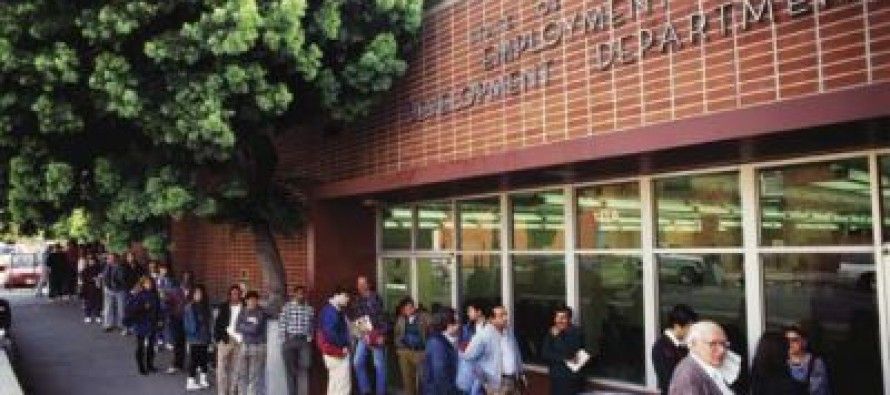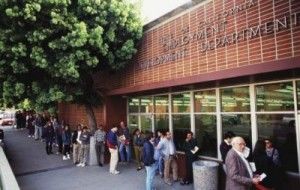Sick leave bill could kill jobs, cut hours

 An Assembly bill requiring employers to provide paid sick leave could result in nearly a million California workers either losing their jobs or having their hours cut.
An Assembly bill requiring employers to provide paid sick leave could result in nearly a million California workers either losing their jobs or having their hours cut.
Assembly Bill 1522, which passed the Assembly and is making its way through the state Senate, would require businesses to provide paid sick leave for employees who work seven or more days in a year. Sick time would accrue at rate of one hour for every 30 hours worked.
Layoffs, cutbacks
Mandated sick leave legislation in San Francisco, Seattle and Connecticut has resulted in about one in seven businesses paying for the new benefit by laying off workers or reducing their hours.
- 15 percent of surveyed San Francisco employees said their hours had been reduced or they had been laid off after the city’s sick leave mandate was implemented, according to a 2011 study for the Institute for Women’s Policy Research; 14 percent received fewer bonuses or had other benefits cut. More than one in five reported increased work demands. Low-wage workers were hardest hit.
- In Seattle, 18 percent of surveyed businesses reduced employee hours or cut jobs in response to the sick-leave mandate, according to a 2013 study by the Employment Policies Institute; 17 percent either eliminated benefits altogether or made employees pay more for benefits; 16 percent of businesses raised prices. “Notably, over 80 percent of surveyed businesses said that sickness in the workplace was not a problem prior to the law’s passage,” said the study’s author Michael Saltsman. “One-third of surveyed businesses anticipated that the law would increase unscheduled absences that may not be connected to any illness.”
- In Connecticut, 12 percent of surveyed businesses cut employee hours and eliminated jobs in response to a sick pay mandate, according to a 2013 EPI study. Twenty percent scaled backed other employee benefits. Thirty-eight percent plan to hire fewer people in the future.
Six million additional California workers would receive sick leave benefits under AB1522, according to the bill’s author, Assemblywoman Lorena Gonzalez, D-San Diego. If California statewide tracks with the results in San Francisco, Seattle and Connecticut, then about 900,000 Californians could lose their jobs or have their hours cut.
Wagner: ‘We just keep piling on’ businesses
That concerns Republicans who argued against the bill on the Assembly floor May 29.
“This bill adds yet another burden on employers,” said Don Wagner, R-Irvine. “It will make it difficult for them to compete. We just keep piling on – what’s one more bill? Well, one more bill hurts our efforts to be competitive. We shouldn’t be doing that.
“We shouldn’t be adding yet another burden when we see Toyota picking up and leaving and going to Texas; when we see the governors of other various different states coming here and recruiting our businesses. At some point we need to stop, realize that the current path is unsustainable.”
Brian Jones, R-Santee, pointed out that there’s no free lunch.
“Employers and employees have to balance the costs of health benefits, paid vacations and sick leave along with the cost of their wages,” he said. “Mandating paid sick leave means the cost of that benefit won’t be available for wages. The expense of that benefit will become a part of the cost of labor along with unemployment insurance and workers compensation.”
He and other Republicans argued for providing more workplace flexibility, such as allowing employees to work more than eight hours in a day without incurring overtime in exchange for flex time on other days.
“Sadly, instead of bringing employers and employees to work together to set the balance of benefits that meet their needs, the Legislature once again wants to substitute its judgment for the best policy in every work place with regard to the size, the industry, work environment or the organization,” said Jones.
Grove: Business death by a thousand cuts
Shannon Grove, R-Bakersfield, asked the legislators to consider the burdens on business owners.
“California still has one of the highest unemployment rates in the nation,” she said. “When you think about all the bills that went through the session in the first couple of years that I was in this, it was kind of like death by a thousand paper cuts. Now it’s almost like death by a thousand stab wounds.”
The sick leave mandate will increase costs $9,400 annually for a company with 20 employees, she said. That cost will be on top of a plethora of other state and federal regulatory burdens on California businesses.
“You keep adding those numbers up and it’s a significant dollar amount,” said Grove. “And I’m telling you, employers are not going to be able to do it. They are cutting wages, they are cutting offices and they are cutting jobs. Because that’s the fastest way to be able to accumulate this money.
“Let employers and employees have flexibility on overtime days. There are solutions to these problems while making sure that employees are taken care of but employers are not brutally punished.”
Gonzalez acknowledged, “Yes, unemployment is a huge issue in California,” but then dismissed Republican concerns as overblown.
“You look at places in California that are doing better, places like San Francisco that, by the way, offers more than twice as many sick days to the workers there,” she said. “It seems that places that have this policy already, New York City, Connecticut, Washington, D.C., are rebounding quicker than places that don’t have this policy. So it’s hard for me to equate unemployment with paid sick days.”
However, the U.S. unemployment rate in April was 6.3 percent, but in Connecticut it was 6.9 percent; in New York City it was 6.9 percent; and in Washington, D.C. — despite all the national tax money spent by the federal government — it was 7.5 percent. (In California, it was 7.8 percent.)
True, San Francisco’s unemployment rate in April was 5.7 percent, lower than the U.S. rate of 6.9 percent. But it’s part of the Silicon Valley-San Francisco corridor that is the engine of the global digital economy. There’s nowhere else like it in the world.
Gonzalez: Will help 6 million workers
Gonzalez said the focus should be on the plight of workers who don’t have sick leave.
“What this will do is fundamentally change the lives of six million California workers who currently don’t have the opportunity to take even an hour of paid sick time,” she said. “It’s good for workers. Most of these workers are low wage and hourly, disproportionately women and Latinos. And they have to choose in their jobs whether to go to work sick and be able to make ends meet – or lose a day’s pay. They also have to make this choice when it’s their child who is sick.
“This is good for taxpayers. We know that parents who have sick time are five times more likely to take their children to a primary care physician rather than the emergency room when they’re sick. This is good for public health. Clearly we don’t need restaurant workers coming to work sick because they know that they have to make ends meet and would rather pay the bills than take a day off.
“And finally, it’s good for employers. Studies show that sick days allow workers to be more productive when they are actually there. It decreases ‘presenteeism.’”
Gonzalez has a personal reason for the legislation.
“I introduce this bill because I’m a single mom,” she said. “At least once every two years I’d get the phone call from a school saying, ‘You need to pick up your child – throwing up, fever, complaining that their stomach hurts.’ Every time that has happened I thought to myself, ‘What do women do who don’t have the ability … to take the time to pick up their child?’ It’s devastating. I never took a sick day for myself. But I’d do for my family.”
Steelworker’s daughter
Shirley Weber, D-San Diego, also has a personal reason for supporting the bill.
“I rise as the daughter of a steelworker who worked for 30-some-odd years, and for the vast majority of those years had no sick leave,” she said. “And I saw him work every day of his life having to go to work because he was sick, because he was a responsible man who took care of his children.
“The only time my father was home sick was when he had the Hong Kong flu. He went to work with coughs and colds and the minor flu, when he didn’t feel well and was dragging because he had no sick leave and had to take care of his children.
“He had eight children who graduated from high school on Friday afternoon. It was the one time of the year he had to take a half-day leave of pay. He lost money to see his eight children graduate from high school.
“None of you would take a job that didn’t have some sick leave attached to it. You have the opportunity in your life to choose where you work. Everyone doesn’t have that choice. This bill is small, but it is a step toward humanity that California needs to take.”
AB1522 passed the Assembly 52-23 along party lines, and next heads to the Senate Judiciary Committee. But at least one Democrat who voted for the bill did so with misgivings.
“As someone who comes from a very small family farm where we employ maybe one or two people depending on the time of year, I wish it would take into consideration very small businesses,” said Susan Eggman, D-Stockton.
“This is very difficult on those businesses. I will be supporting this today. But I just hope that as it moves forward you will continue to consider the very small businesses. Especially in my area where they are the very heart and soul in bringing the economy back to life.”
Related Articles
California Remedy For Eco-Guilt
MAR. 5, 2012 While the Legislature has cavalierly passed global warming laws and companion legislation, they’ve done so without a
CARB Dumps On Dump Truck Industry
FEB. 23, 2011 For Lee Brown, who’s run a dump truck company in Upland for the last 20 years, business
FPPC Investigates Ex-DMV Staff
DEC. 29, 2010 By ANTHONY PIGNATARO It’s always fun to watch one government agency investigate another agency. Or, recently departed


